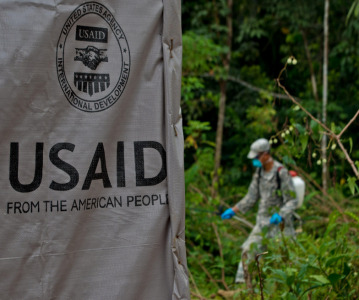Pharma companies research whether vaccines need upgrade to fight Omicron variant

It could take pharmaceutical companies months to tweak their COVID-19 vaccines to provide sufficient protection against the Omicron variant of the coronavirus if it poses a risk of serious illness.
That is the message that Moderna chief executive Stéphane Bancel has conveyed as companies scramble to compile and analyse data on how existing vaccines are performing against Omicron.
In an interview with the Financial Times, Bancel predicted that existing COVID-19 vaccines will be much less effective at tackling the Omicron variant than earlier strains of coronavirus and warned it will take months before companies can manufacture new variant-specific jabs at scale.
He explained that with 32 of the 50 Omicron mutations on the spike protein, which the virus uses to infect human cells, as well as the rapid spread of the variant in South Africa, the current crop of vaccines may need to be modified next year.
“There is no world, I think, where [the effectiveness] is at the same level … we had with Delta,” he told the British newspaper.
However, other voices within the industry have struck a slightly more optimistic tone.
In a statement, Oxford University, which developed the AstraZeneca vaccine, said it would carefully evaluate the implications of the emergence of Omicron for vaccine immunity.
“Despite the appearance of new variants over the past year, vaccines have continued to provide very high levels of protection against severe disease and there is no evidence so far that Omicron is any different,” it said. “However, we have the necessary tools and processes in place for rapid development of an updated COVID-19 vaccine if it should be necessary.”
Talking to Reuters, BioNTech CEO and co-founder Ugur Sahin said Comirnaty, the COVID-19 vaccine the biotech developed with Pfizer, would likely offer strong protection against any severe disease from Omicron.
He said lab tests had already started to analyse the blood of people who had two or three doses of Comirnaty to ascertain whether antibodies found in that blood inactivate Omicron.
“We think it's likely that people will have substantial protection against severe disease caused by Omicron,” he said, specifying severe disease as requiring hospital admission or intensive care.
He added he expects the lab tests to show some loss of vaccine protection against mild and moderate disease due to Omicron, but the extent of that loss was still hard to predict.
While BioNTech is working on an upgraded version of its vaccine, of which more than 2 billion doses have been delivered, it remains unclear whether that is needed, Sahin said.
Merck & Co. said its antiviral molnupiravir is likely to be active against Omicron based on the treatment’s mechanism of action and currently available genomic information.
The company said it has yet to do specific research studying molnupiravir’s effect against Omicron but added that it had previously found that the drug works for the Gamma, Delta, and Mu variants.
On November 30, Merck said the US Food and Drug Administration’s (FDA) Antimicrobial Drugs Advisory Committee (AMDAC) voted 13-10 that the known and potential benefits of molnupiravir outweigh its known and potential risks for the treatment of mild to moderate COVID-19 in high-risk adult patients.
While the FDA is not bound by the committee’s guidance, it does take its advice into consideration.
Related News
-
News US FDA adds haemodialysis bloodlines to devices shortage list
On March 14, 2025, the US FDA published an open letter to healthcare providers citing continuing supply disruptions of haemodialysis bloodlines, an essential component of dialysis machines. -
News Women in Pharma: Manufacturing personal and team success
Our monthly Women in Pharma series highlights the influential lives and works of impactful women working across the pharmaceutical industry, and how the industry can work towards making the healthcare industry and workplace more equitable and inclusive... -
News Pfizer may shift production back to US under Trump pharma tariffs
At the 45th TD Cowen annual healthcare conference in Boston, USA, Pfizer CEO Albert Bourla outlined the potential for Pfizer to shift its overseas drug manufacturing back to the US as pharmaceutical industry players weigh their options against Presiden... -
News Experimental drug for managing aortic valve stenosis shows promise
The new small molecule drug ataciguat is garnering attention for its potential to manage aortic valve stenosis, which may prevent the need for surgery and significantly improve patient experience. -
News Women in Pharma: Connecting accessible pharma packaging to patients – a Pharmapack Special
Throughout our Women in Pharma series, we aim to highlight how CPHI events encourage discussions around diversity, equity, and inclusion initiatives in the pharmaceutical industry. -
News Vertex Pharmaceuticals stock jumps as FDA approves non-opioid painkiller
UK-based Vertex Pharmaceuticals saw their stock shares soar as the US FDA signed off on the non-opioid painkiller Journavx, also known as suzetrigine, for patients with moderate to severe acute pain, caused by surgery, accidents, or injuries. -
News Trump administration halts global supply of HIV, malaria, tuberculosis drugs
In various memos circulated to the United States Agency for International Development (USAID), the Trump administration has demanded contractors and partners to immediately stop work in supplying lifesaving drugs for HIV, malaria, and tuberculosis to c... -
News 2024 Drug Approvals: a lexicon of notable drugs and clinical trials
50 drugs received FDA approval in 2024. The centre for biologics evaluation and research also identified six new Orphan drug approvals as under Biologics License Applications (BLAs). The following list picks out key approvals from the list, and highlig...
Recently Visited
Position your company at the heart of the global Pharma industry with a CPHI Online membership
-
Your products and solutions visible to thousands of visitors within the largest Pharma marketplace
-
Generate high-quality, engaged leads for your business, all year round
-
Promote your business as the industry’s thought-leader by hosting your reports, brochures and videos within your profile
-
Your company’s profile boosted at all participating CPHI events
-
An easy-to-use platform with a detailed dashboard showing your leads and performance







